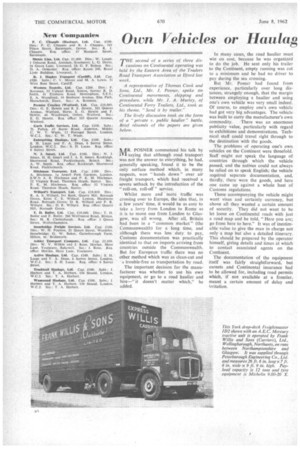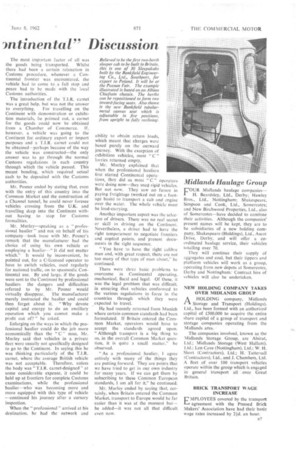Own Vehicles or Haula,A )ntinental" Discussion
Page 32

Page 33

If you've noticed an error in this article please click here to report it so we can fix it.
IUIR. POSNER commenced his talk by IV' saying that although road transport was not the answer to everything, he had, generally speaking, found it to be the only surface method which, in many respects, won "hands down" over air freight transport, which had received a severe setback by the introduction of the " roll-on, roll-off" service.
Whilst more and more traffic was crossing over to Europe, the idea that, in a few years' time, it would be as easy to take a lorry from London to Rome as it is to move one from London to Glasgow, was all wrong. After all, Britain had been in a "common market" (the Commonwealth) for a long time, and although there was less duty to pay, Customs documentation was practically identical to that on imports arriving from countries outside the Commonwealth. But for European traffic there was no other method which was as clean-cut and trouble-free as transkortation by road.
The important decision for the manufacturer was whether to use his own equipment, or go to a road haulier and hire—" it doesn't matter which," he added. In many cases, the road haulier must win on cost, because he was organized to do the job. He sent only his trailer to the Continent, empty running was cut to a minimum and he had no driver to pay during the sea crossing.
But Mr. Posner had found from experience, particularly over long distances, strangely enough, that the margin between employing a haulier and using one's own vehicle was very small indeed. Of course, to employ one's own vehicle had got very big advantages. The vehicle was built to carry the manufacturer's own commodity. There was art enormous publicity value, particularly with regard to exhibitions and demonstrations. Technical staff could travel right through to the destination with the goods.
The problems of operating one's own vehicles on the Continent were threefold. Staff might not speak the language of countries through which the vehicle passed, and the natives could not always be relied on to speak English; the vehicle required separate documentation, and, thirdly, there were the goods, and here one came up against a whole host of Customs regulations.
Those accompanying the vehicle might want visas and certainly currency, but above all they wanted a certain amount of security. They did not want to be let loose on Continental roads with just a road map and be told, "Here you are; go from here to here." It was of inestimable value to give the man in charge not only a map but also a detailed itinerary. This should be prepared by the operator himself, giving details and times at which to contact associated agents on the Continent.
The documentation of the equipment itself was fairly straightforward, but carnets and Continental insurance had to be allowed for, including road permits which, if not available at a frontier, meant a certain amount of delay and irritation.




































































































